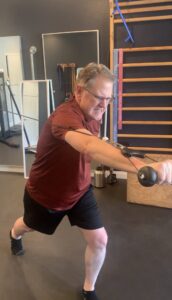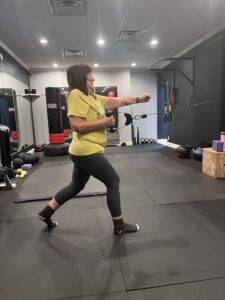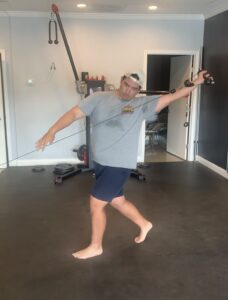Natural Movement and Contralateral Reciprocation: A Perfect Harmony
When we talk about natural human movement, one of the most fascinating and essential concepts is contralateral reciprocation. This is the biomechanical process where opposite limbs (e.g., right arm and left leg) move in sync during activities like walking and running. It’s a fundamental aspect of how our bodies are designed to move, playing a […]
The Evolutionary Benefits of Running: How Our Muscles Are Built for It
Running is more than just a modern fitness trend; it’s deeply rooted in our evolutionary history. Our muscles, bones, and cardiovascular system have evolved specifically to support this high-endurance activity. Here’s why running is not only beneficial but also a natural part of who we are as humans. Evolutionary Background: Born to Run 1. **Human […]
How Our Muscles Evolved from Walking: The Foundation of Human Movement (Part 2)
Walking is more than just a daily activity; it’s a fundamental movement that shaped the evolution of our muscles and overall physiology. Our ability to walk upright on two legs, known as bipedalism, is one of the defining characteristics of being human. This evolutionary milestone not only set us apart from other species but also […]
The Benefits of Walking: A Simple Step to a Healthier Life (Part 1)
Walking is one of the simplest and most accessible forms of exercise, yet it offers a multitude of health benefits that can have a profound impact on your overall well-being. Whether you’re taking a brisk stroll around the block or a leisurely walk through the park, integrating this low-impact activity into your daily routine can […]
What’s Your Excuse?
Common reasons people don’t exercise: ⁃ Kids ⁃ Stress ⁃ Work ⁃ Pain The reasons you should exercise: ⁃ Kids ⁃ Stress ⁃ Work ⁃ Pain When you see it like this, it makes sense. Don’t be the person who always comes up with excuses- find a way to prioritize your health… you only have […]
Your Fundamental Movement
Our exercises load the patterns of the gait cycle. Which means the mechanics of the exercises carry over to the mechanics of walking and running. This is important because as humans we walk daily, it’s one of our most frequently used movements so our goal is to get your body strong in that fundamental context; […]
Good Form on a Bad Exercise
You can’t get your body to do what it can’t do… unless you teach your muscles how to do it. If your body doesn’t have the contractile potential to move a certain way (correctly & efficiently) then it will compensate and use other muscles to achieve a certain function or range of motion, resulting in […]
Can Exercise Be Medicine?
What’s the point of having a “6 pack” or a strong chest if you can’t function at a basic level and walk more than a city block without some form of pain or discomfort; or if you are exercising regularly but regularly suffer from a stiff back or achey knees. Exercise is medicine for all […]
Hurting After Exercise Is Not Normal
It’s one of those days, you just finished a grueling workout at the gym and your joints are aching, your lower back is stiff, and your tendonitis is flared up. Your workout buddies deal with the same aches and pains so you write it off as normal, just part of getting old, and what it takes […]
Your Guide to Squats
It’s time to educate yourself on the relevance of the squat. Prioritizing this movement in your training routine when it makes up a small amount of daily movement, neglects movements that you do majority of the time, like walking. Think about it… outside of the gym how many times a day do you squat compared […]






